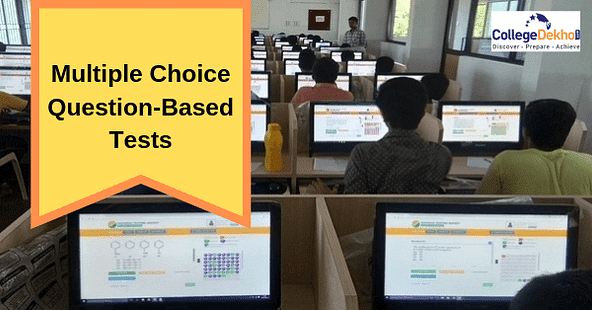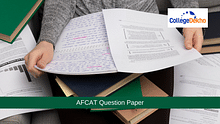There are various entrance tests conducted at the national, state as well as the University level. However, most of the entrance tests that are conducted are done in the multiple-choice format. Given below are some of the pros and cons of this method.

Multiple-choice questions have been around the education industry for quite some years. However, many people, including teachers, parents as well as students across India have had an opinion on it. With the establishment of the National Testing Agency, many Universities, as well as other educational institutions in India, are converting to the computer-based test, wherein the candidates are supposed to report to the testing centres and attempt a series of questions that have been laid out by the respective educational institutions. While many experts speak against the shift in the method of conducting entrance tests, there are others who state otherwise.
This article takes a look at the advantages as well as disadvantages of conducting MCQs. Find below the pros of conducting tests in multiple-choice question format.
Pros of Conducting Tests in MCQ Format
Easy Grading - The first set of people that are benefitted by the use of MCQ aptitude tests are the teachers . How? Well, when you take a standardised test, bring in 500 odd students to sit in the test and ask teachers to analyse the answer sheets, teachers would prefer objective answers over subjective. Therefore, in terms of analysing MCQ answers of 500 odd candidates, it benefits the person who is checking the papers.
Coverage - One of the major reasons that have been provided by the supporters of the MCQ-based aptitude tests is the coverage it provides, in terms of the syllabus and the variety of questions that can be asked. Since answering multiple-choice questions do not require a lot of time, the candidates appearing for the test will be able to answer a lot of questions within a short period of time. This allows institutions or examiners to ask questions pertaining to various different topics and assess not only the knowledge retention abilities but also the scope and the range of his/her learning abilities.
Technology - If the examiner and the agency conducting the test develop an algorithm where the machine itself is able to create questions based on the information that has been fed in the machine, the examiner will not have to worry about structuring the question paper, the machine will be able to do so. Technology will not only help in creating question papers but it's also a great way to check the papers and score the students based on the answers provided. Thus, the burden of checking each and every answer sheet will reduce.
There are many more advantages of multiple-choice question-based standardised tests, however, it also comes with a set of cons. As stated above, to extract the best utility of an MCQ-based aptitude test lies in the hands of the examiner who gives structure to the question. An experienced faculty or teacher will be able to structuralise a question properly without giving away answers to the student but the entire process can still be difficult for an inexperienced person. Let's take a look at the cons of MCQs below.
Cons of Conducting Tests in MCQ Format
Lucky guesses - This is one of the biggest downfalls of MCQ-based entrance tests, aptitude tests or any other standardised tests. The simple provision of one correct answer out of four different options gives even the clueless of all a 25% chance in selecting the right answer. That combined with the chance of the student ruling out one option as a possibility provides the student with a 33% chance of selecting the correct answer. This guessing game becomes a sly opportunity for students to pass tests without providing any factual information to gauge their true abilities. This guessing game leads to the next point, which is;
Guessers, not Thinkers - The wide application of MCQ-based standardised tests across the country will slowly turn the future generation of the country into people who are good at guessing, however, do not possess the knowledge for knowing the answers to the how, why, when, what, where and who questions of different topics. Although, developing an ability to guess is a good thing in its own, however, too much of anything can be harmful in the long run.
Time Needed for Well-Developed Tests - As has been stated many times above, the person who is developing the questions has the sole ability to make the MCQ test paper easy or difficult. However, the time and effort needed to create such a test paper are high. The chances of completely giving away the right answer to the students appearing for the test grow higher with just one wrong word placement.
MCQs are not made for every type of question - Another big reason as to why MCQs can be restrictive in nature is as one cannot ask subjective questions. Certain questions such as pertaining to mathematics can be easily answered in an objective manner, however, the ability to provide the working and reasoning behind the answer that has been selected by the student cannot be figured out.
However, the computerised form of tests brings in various other limitations such as the inability of the digitalisation process to reach the backward places in India.
Computerised MCQ-Based Standardised Tests
National level entrance tests, as well as various University and state-level entrance tests, have now taken a turn towards Computer-Based Tests (CBT) in order to shortlist candidates for various degrees and programmes. India has been quickly developing in terms of technology and computerised entrance tests are starting to become the norm for testing the candidate's aptitude.
Also Read: Law Admission Without National-Level Entrance Exam Score
Some of the educational institutes have opted for Computer-Based Tests for the purpose of admissions. However, some of the institutes are yet to adopt this method in their admission processes and still choose to conduct entrance tests in the pen and paper mode. Some of the major reasons why institutes still conduct pen and paper tests are due to the large investments that are required to set up the required computer labs along with the needed equipment for conducting such large scale tests. However, a one-time large investment would still be cheaper than years of printing and the different logistical needs as well as the evaluation costs required to complete the tests.
With the increasing competition and the continuation of more and more tests being conducted in MCQ format, students have now become used to this format which has also led to the students learning the type of questions that are frequently asked in these tests. This has further led to high competition between students. With such a high competition, the question that arises is if a newer and more advanced method of testing needs to be developed, to test the overall aptitude of the student while keeping the integrity of such aptitude tests.
Also Read: State Wise Polytechnic Entrance Exams - Eligibility & Admission Process
In order to answer whether or not MCQs or rather computerised MCQ-based standardised tests are a boon or bane, the answer remains quite vague. While the entrance tests conducted in MCQ format may be the answer to checking the range of knowledge that a prospective student possesses, they don't really help in understanding the true potential of a candidate. One possible alternative that can be opted by different testing agencies or bodies is to use an appropriate amount of both subjective as well as objective questions so that the institute can gauge the aptitude of the candidates.

















Similar Articles
Bhim Rao Ambedkar College CUET UG Cutoff 2024: Expected Cutoff based on Previous Trends
CUET Passing Marks for BHU: Category-wise Passing Marks
Bihar STET 2024: Answer Key (Out), Result, Cutoff
How to Crack AFCAT in 30 Days?
List of Fake Universities in India 2024 by UGC (New List)
AFCAT 2024 Application Form Correction - Dates, Process, How to Edit